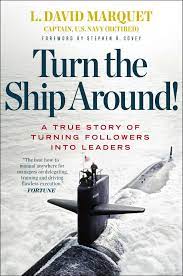How do you empower and inspire staff to take more ownership and accountability in their role?
 Throughout my professional career, I have attempted to answer this question. And until I read David Marquet’s powerful book, Turn the Ship Around!, I did not realize how to instill a leadership mindset with my teams. Marquet tells the story of how, in just a few years, he turned one of the worst-performing submarines in the US Navy into one of the best, just by changing the Leader-Follower model into a Leader-Leader one. As he explains:
Throughout my professional career, I have attempted to answer this question. And until I read David Marquet’s powerful book, Turn the Ship Around!, I did not realize how to instill a leadership mindset with my teams. Marquet tells the story of how, in just a few years, he turned one of the worst-performing submarines in the US Navy into one of the best, just by changing the Leader-Follower model into a Leader-Leader one. As he explains:
“The leader-leader structure is fundamentally different from the leader-follower structure. At its core is the belief that we can all be leaders…and, in fact, it is best when we all are leaders. Leadership is not some mystical quality that some possess and others do not. As humans, we all have what it takes, and we all need to use our leadership.”
His philosophy is based on 3 pillars: Control, Competence, and Clarity.
The First Pillar: Control
What does that empowerment look like? It means “giving control” rather than holding onto it. Marquet offers some helpful advice:
- Act your way to new thinking

- Short, early conversations make efficient work
- Use “I intend to” to make passive followers into active leaders
- Resist the urge to provide solutions
- Eliminate top-down monitoring systems
- Think out loud
- Find the genetic code of your organization and rewrite it
Highlighting a few of these points:
- Using “I Intend to…” is a powerful way to create better accountability. I regularly start our daily standup meetings with a question: “What do you intend to achieve today?” Rather than coming in as a top-down leader directing the tasks for the day, I attempt to create a space in which the staff can define and prioritize their own tasks for projects and deliverables.
- Eliminating top-down monitoring systems may sound counterintuitive for an IT company that relies on data to keep systems functioning optimally, but what Marquet is referring to are the systems that track the minutiae of what employees are doing. Marquet suggests that such systems are a waste of management overhead, but should be instead used to increase visibility, track trends, and identify solutions.
- Thinking out loud is also a terrific way to change the leader/follow dynamic. If you encourage people to think out loud in discussions (and do it yourself), people will stop thinking about authority and explain their opinions.
The Second Pillar: Competence
 “Is it safe?” A nuclear submarine is a complex and dangerous war weapon. It is not enough to simply give control to others; you must be sure that your team has the competence to succeed to go along with the power to navigate. This checklist helps to improve competence and proficiency:
“Is it safe?” A nuclear submarine is a complex and dangerous war weapon. It is not enough to simply give control to others; you must be sure that your team has the competence to succeed to go along with the power to navigate. This checklist helps to improve competence and proficiency:
- Take deliberate action
- Continually and consistently repeat the message
- Specify goals, not methods
- Don’t brief, certify
Continually and consistently repeat the message if you want people to change their minds or apply a new method. Your staff will eventually learn; their competence is (hopefully) not an issue. Changing the message halfway will only create confusion and a lack of direction. Stay consistent in your messaging, and the new way of operating will eventually be adapted.
Specifying goals instead of methods creates confidence. When people focus on implementing methods to achieve a goal, they get stuck and forget the purpose. They only focus on implementing the process. When the focus is placed on goals, methods are better adopted, and superior approaches are often used to achieve those goals.
 Don’t brief, certify. Prior to his arrival, Marquet’s crew often didn’t absorb the content of briefings, and would regularly take incorrect actions. Briefings were passive and didn’t create engagement. Instead, he required certification of each crew member before sending them off to perform the operation. During a certification, the person in charge of a team asks questions; at the end of the certification, a decision is made whether to proceed (or not). This process engages every team member and requires preparation before the operation. When people know that they will be asked questions, they prepare ahead of time.
Don’t brief, certify. Prior to his arrival, Marquet’s crew often didn’t absorb the content of briefings, and would regularly take incorrect actions. Briefings were passive and didn’t create engagement. Instead, he required certification of each crew member before sending them off to perform the operation. During a certification, the person in charge of a team asks questions; at the end of the certification, a decision is made whether to proceed (or not). This process engages every team member and requires preparation before the operation. When people know that they will be asked questions, they prepare ahead of time.
The Third Pillar: Clarity
As an organization, we need to know the big picture and what we are trying to accomplish. What does clarity in action look like? To convey clarity, Marquet suggests:
- Build trust and take care of your people
- Begin with the end in mind
- Encourage questioning over blind obedience
- Use your legacy for inspiration
- Use immediate recognition to reinforce desired behavior
Some highlights for me:
Build trust and take care of your people by giving them the tools to succeed and advocate for their professional goals and aspirations.
Encouraging questioning over blind obedience creates a space of empowerment and ownership. Questioning orders in the Navy is not common practice, but in a few of Marquet’s examples, junior officers questioned his orders when those orders placed the ship in danger (and those questions were welcomed).
Using immediate recognition helps to reinforce desired behavior. Reward your staff as soon as possible when deserved; delayed rewards lose their meaning, and you can have a challenging time justifying achievements later.
And finally, it is important to establish principles that will guide your organization when faced with a tricky situation. Some examples:
 Initiative
Initiative - Innovation
- Intimate technical knowledge
- Courage
- Commitment
- Continuous Improvement
- Integrity
- Empowerment
- Teamwork
- Openness
- Timeliness
While these are Marquet’s suggestions, I am proud of the fact that the list aligns very well with Infracore’s 3 core values of integrity, commitment, and trust.
There are many other leadership nuggets in Marquet’s book regarding the Leader-Leader model; check out this video if you have been inspired to learn more! You can also find Marquet’s book and other info on his site.
Very well written Bryan! Love this!